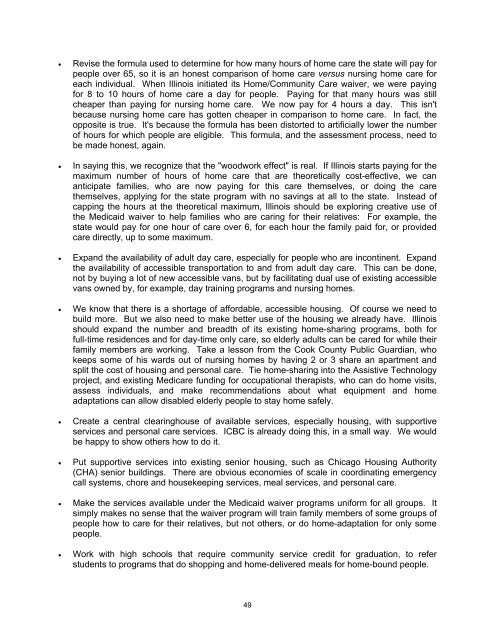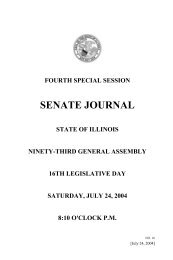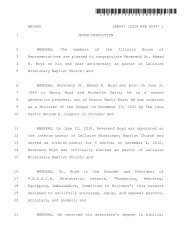Long-Term Care - Illinois General Assembly
Long-Term Care - Illinois General Assembly
Long-Term Care - Illinois General Assembly
You also want an ePaper? Increase the reach of your titles
YUMPU automatically turns print PDFs into web optimized ePapers that Google loves.
• Revise the formula used to determine for how many hours of home care the state will pay for<br />
people over 65, so it is an honest comparison of home care versus nursing home care for<br />
each individual. When <strong>Illinois</strong> initiated its Home/Community <strong>Care</strong> waiver, we were paying<br />
for 8 to 10 hours of home care a day for people. Paying for that many hours was still<br />
cheaper than paying for nursing home care. We now pay for 4 hours a day. This isn't<br />
because nursing home care has gotten cheaper in comparison to home care. In fact, the<br />
opposite is true. It's because the formula has been distorted to artificially lower the number<br />
of hours for which people are eligible. This formula, and the assessment process, need to<br />
be made honest, again.<br />
• In saying this, we recognize that the "woodwork effect" is real. If <strong>Illinois</strong> starts paying for the<br />
maximum number of hours of home care that are theoretically cost-effective, we can<br />
anticipate families, who are now paying for this care themselves, or doing the care<br />
themselves, applying for the state program with no savings at all to the state. Instead of<br />
capping the hours at the theoretical maximum, <strong>Illinois</strong> should be exploring creative use of<br />
the Medicaid waiver to help families who are caring for their relatives: For example, the<br />
state would pay for one hour of care over 6, for each hour the family paid for, or provided<br />
care directly, up to some maximum.<br />
• Expand the availability of adult day care, especially for people who are incontinent. Expand<br />
the availability of accessible transportation to and from adult day care. This can be done,<br />
not by buying a lot of new accessible vans, but by facilitating dual use of existing accessible<br />
vans owned by, for example, day training programs and nursing homes.<br />
• We know that there is a shortage of affordable, accessible housing. Of course we need to<br />
build more. But we also need to make better use of the housing we already have. <strong>Illinois</strong><br />
should expand the number and breadth of its existing home-sharing programs, both for<br />
full-time residences and for day-time only care, so elderly adults can be cared for while their<br />
family members are working. Take a lesson from the Cook County Public Guardian, who<br />
keeps some of his wards out of nursing homes by having 2 or 3 share an apartment and<br />
split the cost of housing and personal care. Tie home-sharing into the Assistive Technology<br />
project, and existing Medicare funding for occupational therapists, who can do home visits,<br />
assess individuals, and make recommendations about what equipment and home<br />
adaptations can allow disabled elderly people to stay home safely.<br />
• Create a central clearinghouse of available services, especially housing, with supportive<br />
services and personal care services. ICBC is already doing this, in a small way. We would<br />
be happy to show others how to do it.<br />
• Put supportive services into existing senior housing, such as Chicago Housing Authority<br />
(CHA) senior buildings. There are obvious economies of scale in coordinating emergency<br />
call systems, chore and housekeeping services, meal services, and personal care.<br />
• Make the services available under the Medicaid waiver programs uniform for all groups. It<br />
simply makes no sense that the waiver program will train family members of some groups of<br />
people how to care for their relatives, but not others, or do home-adaptation for only some<br />
people.<br />
• Work with high schools that require community service credit for graduation, to refer<br />
students to programs that do shopping and home-delivered meals for home-bound people.<br />
49
















